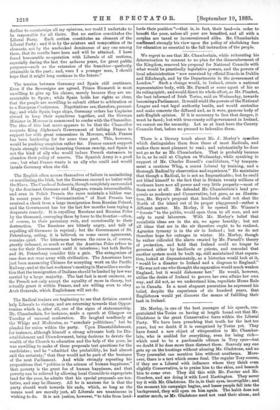There is a literary touch about Mr. J. Morley's speeches
which distinguishes theta from those of most Radicals, and makes them most pleasant to read; and substantially he does not go as far as Mr. Chamberlain. That is probably because he is, as he said at Clapton on Wednesday, while speaking in support of Mr. Charles Russell's candidature, by tempera- ment a cautious Whig, a sound Liberal by training, and a thorough Radical by observation and experience." He maintains that though a Radical, he is not an Impracticable; but he could not blind himself to the fact that in Britain twenty millions of workmen have now all power and very little property—most of them none at all. He defended Mr. Chamberlain's land pro- posals as moderate and Conservative, but gave, as an illustra- tion, Mr. Bryce's proposal that landlords shall not shut the North of the island out of its proper playground—rather a different matter. Mr. Morley, if he opened Mr. Winans's "forests "to the public, would open them to all men, and not only to rural labourers. With Mr. Morley's belief that socialistic ideas are in the air, we agree heartily ; but not all ideas that are in the air therefore ought to be realised. Agrarian tyranny is in the air in Ireland ; but we do not therefore hope for outrages in winter. Mr. Morley, though he rather ridiculed the alarm created by Mr. Parnell's theory of protection, and held that Ireland could no longer be governed either by landlords or priests, and conceded that another system must be built up, still maintained that separa- tion, looked at dispassionately, as a historian would look at it, "would be a disaster to Ireland and a disgrace to England." "He was not one who thought the separation would much weaken England, but it would dishonour her." He would, however, utilise the desire of Ireland. to govern her own affaim her own way, and did not, as we understand him, repudiate Home Rule as in Canada. In a most eloquent peroration he expressed his belief, despite the experience of six hundred years, that Englishmea would yet discover the means of fulfilling their task in Ireland.


































 Previous page
Previous page